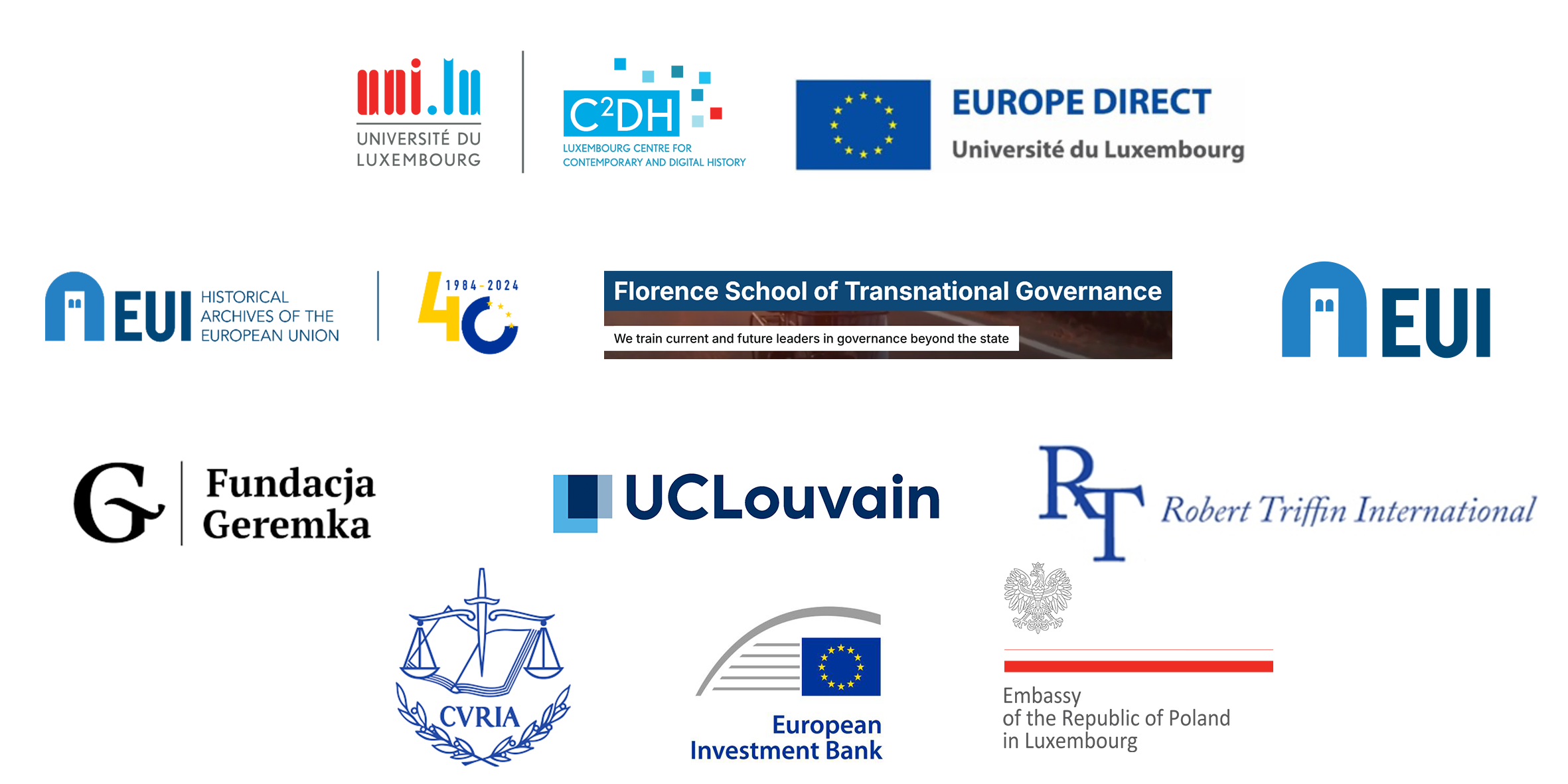The fifth edition of the Winter (Online) Lecture Series on Europe will take place at the University of Luxembourg from 2nd to 17 December 2024 in connection with the courses “History of European integration (1919-1993)” (MAHEC-142) and “Economic and social history of Europe after 1945: concepts, processes, actors” (MAHEC-63) from the Master in European Contemporary History, and the course “Democratic transitions in Central and Eastern Europe” (BCE-EU-301-04) from the Bachelor in European Cultures.
The aim is to give students on these programmes, as well as the wider academic community at the University of Luxembourg, the opportunity to find out about the history and workings of the European institutions in Luxembourg from new and unconventional angles and to discuss some of the milestones in contemporary European history with people who were involved in or witnessed these events. Each session (in French or English, with a Q&A session in French and English) will be streamed via Webex and will include a presentation by a speaker followed by a discussion with the audience and the opportunity to ask questions.
The lectures, which are also open to the wider public, are run in conjunction with Europe Direct at the University of Luxembourg (ED-UNILU) – a competitive European public history project co-funded by the European Union (2021-2025) – and several other partners including: the Historical Archives of the European Union (HAEU), the Alcide De Gasperi Research Centre on the History of European Integration at the European University Institute (EUI) (Florence, Italy), Florence School of Transnational Governance, Bronisław Geremek Foundation (Warsaw, Poland), Embassy of Poland in Luxembourg, Robert Triffin Chair at the Université Catholique de Louvain (UCL) (Belgium), Robert Triffin International Foundation (RTI) (Belgium), the Court of Justice of the European Union (CJUE) and the European Investment Bank (EIB).
The Winter Online Lecture Series on Europe will feature the following sessions:
The conference will be held in English.
Guest lecturer: Mr Wojciech Białożyt, Visegrad Fund Research Fellow at the Historical Archives of the European Union (HAEU), Member of the Management Board of the Bronisław Geremek Foundation (Warsaw, Poland).
Short biography: Mr Wojciech Białożyt is an analyst and executive with a broad experience gained in Poland and on the EU level. In 2023/2024, he was Policy Leader Fellow at Florence School of Transnational Governance conceptualising the place of democracy in the European security architecture. He was also recipient of Visegrad Fund Research Grant at the Historical Archives of the European Union (HAEU), within which he researched on relations between the Polish Solidarity movement and the European institutions 1980-1989. Since 2019, he serves as Member of the Management Board of the Bronisław Geremek Foundation in Warsaw, a body named after Poland’s democracy architect and visionary European. He represents the Foundation in the EP Network of Political Houses and Foundations of Great Europeans.
Abstract: On 1 May 2004, with the accession of 10 candidate countries (Cyprus, Czechia, Estonia, Hungary, Latvia, Lithuania, Malta, Poland, Slovakia and Slovenia), the European Union (EU) not only marked the biggest enlargement in its history, but also opened up for the first time to the countries of Central and Eastern Europe, which had embarked on the transition to freedom, democracy and a market economy after long decades of communist and dictatorial regimes. On 26 April 2005, Bulgaria and Romania have also been included in this process. Exploring retrospectively 20 years of European integration through new archives and historical sources, this presentation will examine Poland’s experience in democratisation, Europeanisation and EU integration, and will particularly highlight the strategical thinking and political action and of Professor Bronisław Geremek, who has played a crucial role in this process.
The conference will be held in English.
Guest lecturer: Prof. Ivo Maes, Robert Triffin Chair at the Université Catholique de Louvain (UCL), ICHEC Brussels Management School, Non-resident Fellow at Bruegel (Belgium).
Short biography: Ivo Maes is a Professor, Robert Triffin Chair, at the Université Catholique de Louvain and at ICHEC Brussels Management School as well as a Non-resident fellow at Bruegel. He retired in 2021 as a Senior Advisor at the Economics and Research Department of the National Bank of Belgium. He has a Ph.D. in Economics from the Katholieke Universiteit Leuven and a M.Sc. in Economics from theLondon School of Economics. In 2003, he was a member of the Committee for Institutional Reform of the West African Monetary Union. From May 2015 to June 2018, he served as the President of the Council of the European Society for the History of Economic Thought. He has been a visiting professor at several universities, among them Duke University (USA), the Université de Paris-Sorbonne and the Università Roma Tre. He has published extensively on European monetary integration and the history of central banking and monetary theory. Among his books are Economic Thought and the Making of European Monetary Union, (Edward Elgar, 2002), Half a century of European financial integration. From the Rome Treaty to the 21st century (Mercatorfonds, 2007), A Century of Macroeconomic and Monetary Thought at the National Bank of Belgium (National Bank of Belgium, 2010), Alexandre Lamfalussy. The Wise Man of the Euro. A conversation with Christophe Lamfalussy, Ivo Maes and Sabine Péters (LannooCampus, 2013), Architects of the Euro. Intellectuals in the Making of European Monetary Union (editor, with Kenneth Dyson, Oxford University Press, 2016) and Robert Triffin : A Life (with Ilaria Pasotti, preface by Jacques de Larosière, Oxford University Press, 2021, Best Book Award of the Italian and the European societies for the History of Economic Thought). In May 2018, he was awarded the Camille Gutt Prize for his scientific publications on money and finance, especially the making of European monetary union.
Abstract: In the process towards European economic and monetary union, two reports played crucial roles. The 1970 Werner Report argued for both a supranational monetary pillar and a supranational economic pillar, while the 1989 Delors Report focused on the monetary pillar, and there was scepticism about discretionary fiscal policy. A background paper to the Delors Report, ‘The Werner Report Revisited’, identified four weaknesses of the Werner Report: absence of internal momentum, institutional ambiguities, insufficient constraints on national policies and an inappropriate policy conception – issues that remain very much on the European Union agenda today.
The conference will be held in English.
Guest lecturer: Dr Dieter Schlenker, Director of the Historical Archives of the European Union (HAEU), Co-director of the Alcide De Gasperi Research Centre on the History of European Integration at the European University Institute (EUI)
Short biography: Dieter Schlenker is the Director of the Historical Archives of the European Union since January 2013 and Co-director of the Alcide De Gasperi Research Centre on the History of European Integration since 2015. He teaches archival science at the Alma Mater Europaea University in Maribor, the State Archives of Florence, the European College of Parma, and the International Institute for Archival Science in Trieste. He is board member of the EU Liaison Committee of Historians and the European Association for Banking and Finance History. He previously worked for UNESCO, first as archivist at the Paris Headquarters, then as Head of the Information and Knowledge Management Unit in Bangkok, Thailand. Before, he worked as Records Manager at Ford Company European Headquarters in Cologne and at FAO Headquarters in Rome. Schlenker holds an Archivist Diploma from the Archival School of the Vatican Secret Archive, a Journalist Diploma from the Freie Journalistenschule Berlin (FJS) and a PhD in Modern History from the University of Heidelberg, Germany.
Abstract: The presentation will offer a broad overview of the Historical Archives of the European Union (HAEU) founded in 1983 and will explore its wide range of multilingual, multimedia sources and archives for both researchers and the general public, while also analysing the current interdisciplinary challenges, historiographical issues and innovative practices which it is facing in the digital age. ‘The common European memory is best captured and preserved in the Historical Archives of the European Union, where the archives of the EU institutions are preserved along with the documents of pioneers and visionaries, political leaders and the many European witnesses from movements, associations and political groups’. (Dieter Schlenker, 2024). The presentation will also highlight the research interests and objectives of the the Alcide De Gasperi Research Centre – that emerged as a joint initiative of the HAEU and the EUI’s Department of History and Civilisation – and which is a unique research hub on European cooperation and integration from the twentieth century to the present.
Documentary visit on the premises and in-person conference reserved exclusively for the students of the course “Democratic transitions in Central and Eastern Europe” (BCE-EU-301-04) from the Bachelor in European Cultures.
Documentary visit on the premises and in-person workshop reserved exclusively for the students of the course “History of European integration (1919-1993)” (MAHEC-142) from the Master in European Contemporary History.
Documentary visit on the premises and research seminar reserved exclusively for the students of the course “Economic and social history of Europe after 1945: concepts, processes, actors” (MAHEC-63) from the Master in European Contemporary History.

